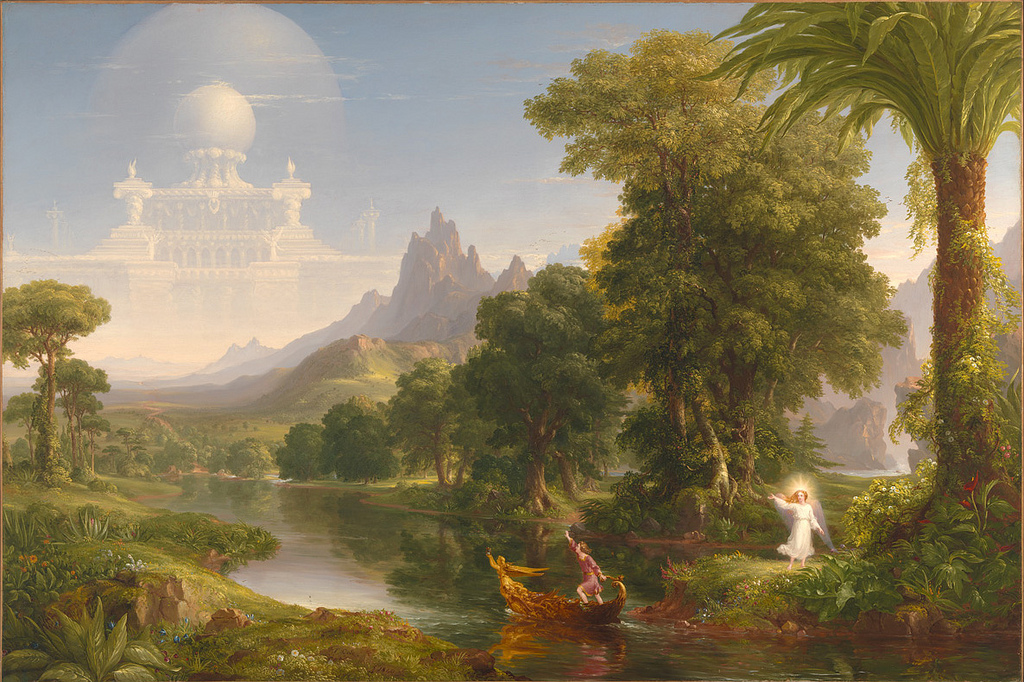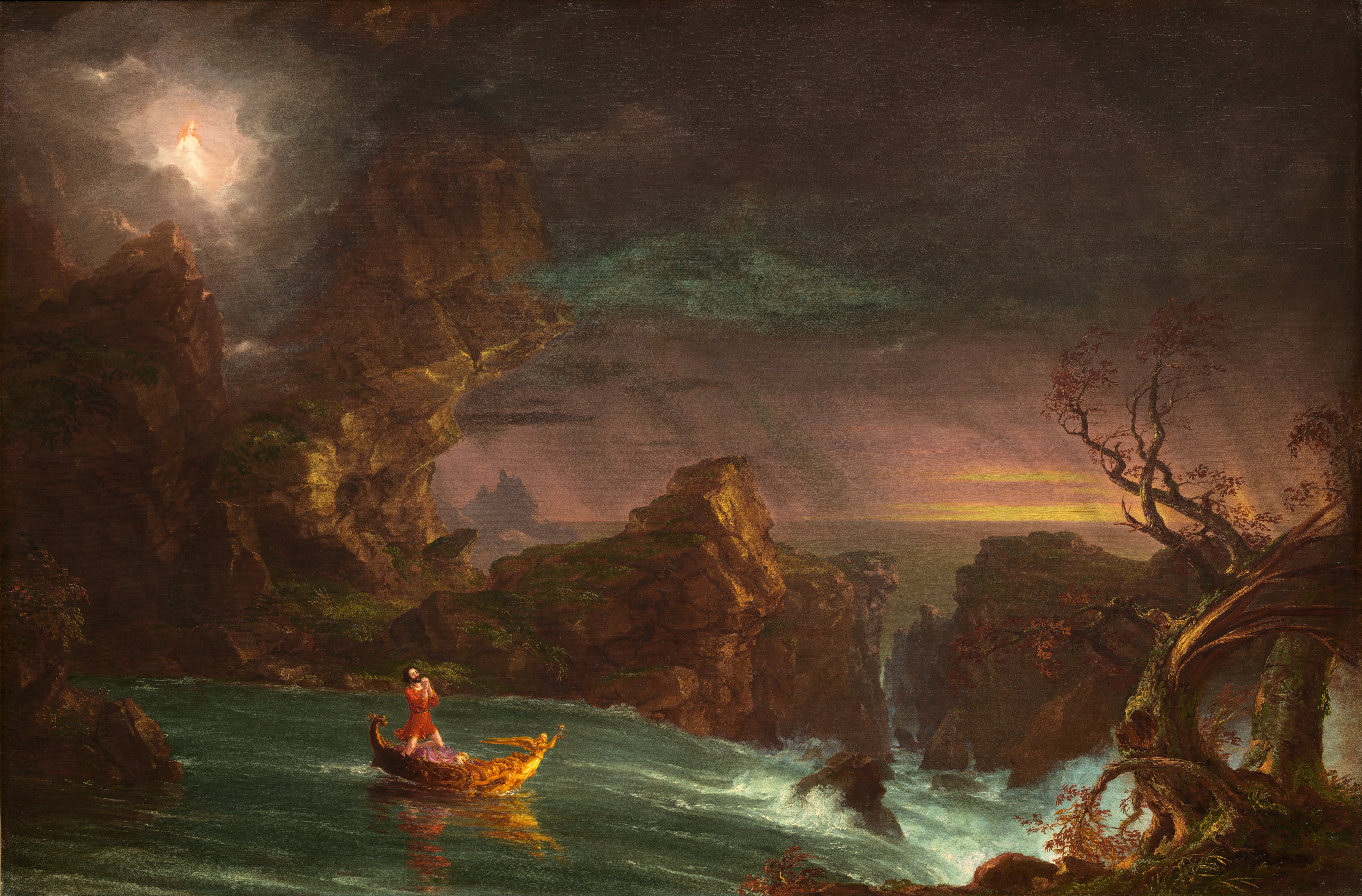It's Supposed to Feel Like This
January 27, 2023
One thing that isn’t often discussed is how much grief you experience just by growing up.
Thomas Cole’s 1840 and 1842 works called The Voyage of Life allegorize the trajectory of a man’s life in a series of 4 paintings, depicting childhood, youth, manhood, and old age. Cole accompanied his paintings with a description of each.

A stream is seen issuing from a deep cavern, in the side of a craggy and precipitous mountain, whose summit is hidden in clouds. From out the cave glides a Boat, whose golden prow and sides are sculptured into figures of the Hours: steered by an Angelic Form, and laden with budsand flowers, it bears a laughing Infant, the Voyager whose varied course the artist has attempted to delineate. On either hand the banks of the stream are clothed in luxuriant herbage and flowers. The rising sun bathes the mountains and the flowery banks in rosy light. The dark cavern is emblematic of our earthly origin, and the mysterious Past. The Boat, composed of Figures of the Hours, images the thought, that we are borne on the hours down the Stream of Life. The Boat identifies the subject in each picture. The rosy light of the morning, the luxuriant flowers and plants, are emblems of the joyousness of early life. The close banks, and the limited scope of the scene, indicate the narrow experience of Childhood, and the nature of its pleasures and desires. The Egyptian Lotus in the foreground of the picture is symbolical of Human Life. Joyousness and wonder are the characteristic emotions of childhood.
Thomas Cole
Childhood is rife with joy, wonder, exploration, and uncertainty, emerging from the “mysterious past” into the known world. It is a sheltered existence, but with much to learn and explore. The crag of the dark cliffs, the cave, and the high banks of the stream testify to the ambiguity and uncertainty of childhood, but the lush flowers and the bright sunrise communicate the intense wonder of childhood. The boat, calm and stable, is piloted by the angel, here representing the gracious providence of God in sustaining, protecting, and nurturing the child, keeping, at all times, a close watch and a steady hand on the tiller.

The stream now pursues its course through a landscape of wider scope and more diversified beauty. Trees of rich growth overshadow its banks, and verdant hills form the base of lofty mountains. The Infant of the former scene is become a Youth, on the verge of Manhood. He is now alone in the Boat, and takes the helm himself; and in an attitude of confidence and eager expectation, gazes on a cloudy pile of Architecture, an air-built Castle that rises dome above dome in the far-off blue sky. The Guardian Spirit stands upon the bank of the stream, and with serious yet benignant countenance seems to be bidding the impetuous voyager ‘God Speed.’ The beautiful stream flows directly toward the aerial palace, for a distance; but at length makes a sudden turn, and is seen in glimpses beneath the trees, until it at last descends with rapid current into a rocky ravine, where the voyager will be found in the next picture. Over the remote hills, which seems to intercept the stream and turn it from its hitherto direct course, a path is dimly seen, tending directly toward that cloudy Fabric, which is the object and desire of the voyager.
The scenery of this picture—its clear stream, its lofty trees, its towering mountains, its unbounded distance, and transparent atmosphere—figure forth the romantic beauty of youthful imaginings, when the mind magnifies the Mean and Common into the Magnificent, before experience teaches what is the Real. The gorgeous cloudbuilt palace, whose most glorious domes seem yet but half revealed to the eye, growing more and more lofty as we gaze, is emblematic of the day-dreams of youth, its aspirations after glory and fame; and the dimly-seen path would intimate that Youth, in his impetuous career, is forgetful that he is embarked on the Stream of Life, and that its current sweeps along with resistless force, and increases in swiftness as it descends toward the great Ocean of Eternity.
Thomas Cole
Youth is marked in young men by eager expectation: a desire to begin the grand adventure of life on one’s own. The youth takes every opportunity of independence thrown at him, his disposition ever fixed by lofty goals and grand dreams, which enchant his mind like a great arial city rising spectacularly above all that he can see, all he has ever known, and all he will ever experience. Having only ever known the calm waters of the stream, the youth is confident that he will be able to endure and accomplish all that he intends to. Unlike the child, whose past is a mystery and whose path forward is shrouded with the elements of discovery, the youth sees what he believes to be a clear path forward to his intended destination. Providence has bid him, “Godspeed”.

Storm and cloud enshroud a rugged and dreary landscape. Bare impending precipices rise in the lurid light. The swollen stream rushes furiously down a dark ravine, whirling and foaming in its wild career, and speeding toward the Ocean, which is dimly seen through the mist and falling rain. The boat is there, plunging amid the turbulent waters. The voyager is now a man of middle age: the helm of the boat is gone, and he looks imploringly toward heaven, as if heaven’s aid alone could save him from the perils that surround him. The Guardian Spirit calmly sits in the clouds, watching with an air of solicitude the affrighted voyager. Demon forms are hovering in the air.
Trouble is characteristic of the period of Manhood. In Childhood there is no cankering care; in Youth no despairing thought. It is only when experience has taught us the realities of the world, that we lift from our eyes the golden veil of early life; that we feel deep and abiding sorrow; and in the picture, the gloomy, eclipse-like tone, the conflicting elements, the trees riven by tempest, are the allegory; and the Ocean, dimly seen, figures the end of life, to which the voyager is now approaching. The demon forms are Suicide, Intemperance, and Murder, which are the temptations that beset men in their direst trouble. The upward and imploring look of the voyager, shows his dependence on a Superior Power, and that faith saves him from the destruction that seems inevitable.
Thomas Cole
The sharp contrast from the bright optimism of youth to the dark and stormy tempest of manhood is what is most striking. A man, unlike a youth, has bills to pay, a family to feed, protect, and care for, and a myriad of stresses, worries, and demands for his efforts at each moment. His youth gave him a sense of control, but manhood has revealed to him that what control he has over his circumstances is limited. He has lost the tiller to his boat, and his eyes are turned not towards the arial city of his youthful dreams, but towards heaven alone. Intemperance, murder, and suicide tempt him to escape the experience of life, but God has not left him alone. Just as when he was a child, he is facing an uncertain world. Just as when he was a child, God in His Providence still watches over him. Though the tiller to his boat is missing, God in His Providence still steers its every direction with a calm hand. His hands are clasped as he prays a simple prayer: “just give me today”.
The transition from youth to manhood is a transition from possibility to reality. The man has gained a woman, a family, a job, a home, a life, but in gaining these things he has lost possibilities for their alternatives. Life didn’t turn out like he expected. He was hoping to be further along, hoping to have more under control and be more on course for the things he aspired to achieve when he was young. Every so often, when a break in the tempest offers him vantage, he sees the arial city again, but every time it appears more faint, more distant, more unachieveable, before it is again covered by the dark stormclouds and the ever-rising walls of the perilous canyon he is entering. He has achieved some of his goals, but they didn’t turn out like he planned. Some of his dreams are still alive, but others are dying before his eyes. At times, he wishes he could turn back to youth, but he cannot; the current is too switft, the way too perilous, and besides, he has lost control of the boat. Somewhere, at some point, the open waters of youth became contrained into a single destiny; the possibilities of youth collapsed into an actuality, and the many real lives he could have lived have been replaced by one, actual life. The youth, now a man, has lost many things, including his control, his confidence, and his dreams. He finds that life is, at times, boring, mundane, and tiresome. Other times, he is filled with fear, regret, and sadness. Strong drink, drugs, suicide, and violence tempt him as means of escape, but they are false escapes. The hope for man is in the day-to-day; we are to rise, pray, believe God, and give thanks, knowing that we are sustained by him daily.
This is the grief of manhood.
It’s supposed to feel like this.

Portentous clouds are brooding over a vast and midnight Ocean. A few barren rocks are seen through the gloom— the last shores of the world. These form the mouth of the river, and the boat, shattered by storms, its figures of the hours broken and drooping, is seen gliding over deep waters. Directed by the Guardian Spirit, who thus far has accompanied him unseen, the voyager, now an old man, looks upward to an opening in the clouds, from whence a glorious light bursts forth, and angels are seen descending the cloudy steps, as if to welcome him to the Haven of Immortal Life.
The stream has now reached the Ocean, to which all life is tending. The world, to Old Age, is destitute of interest. There is no longer any green thing upon it. The broken and drooping figures of the boat show that Time is nearly ended. The chains of corporeal existence are falling away; and already the mind has glimpses of Immortal Life. The angelic Being, of whose presence until now the voyager has been unconscious, is revealed to him, and with a countenance beaming with joy, shows to his wondering gaze scenes such as the eye of mortal man has never yet seen.
Thomas Cole
Like the youth, who looked forward to life with a sense of certainty, the old man looks in the same direction, to the left, towards the Ocean of Eternity. He is weary of life, battered by its trials, and surrounded by gloom. Life didn’t turn out like he had planned. He never reached the arial city of his youth; he has long forgotten about it, but learned to be joyful regardless. God graciously greets him in His Providence, and welcomes him home.